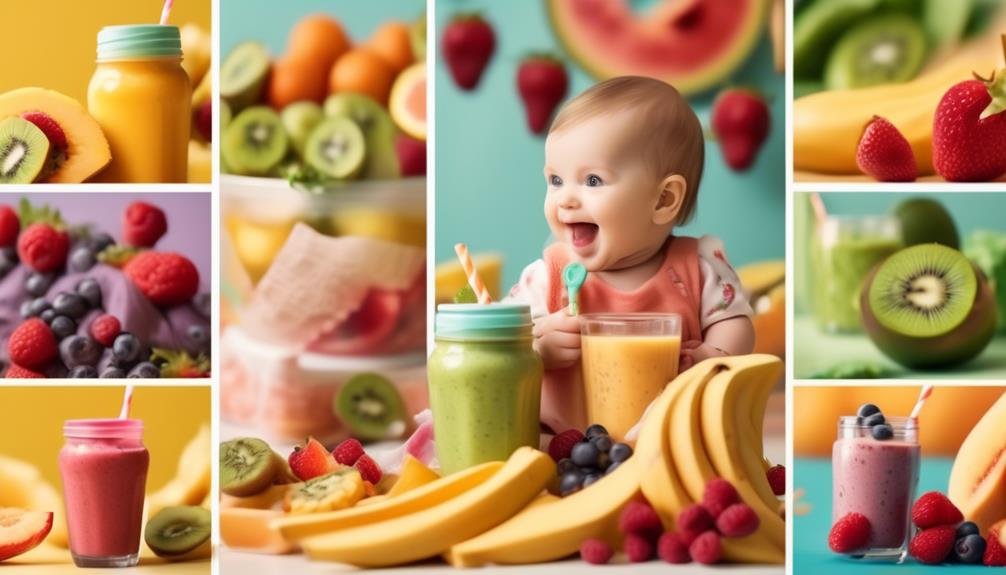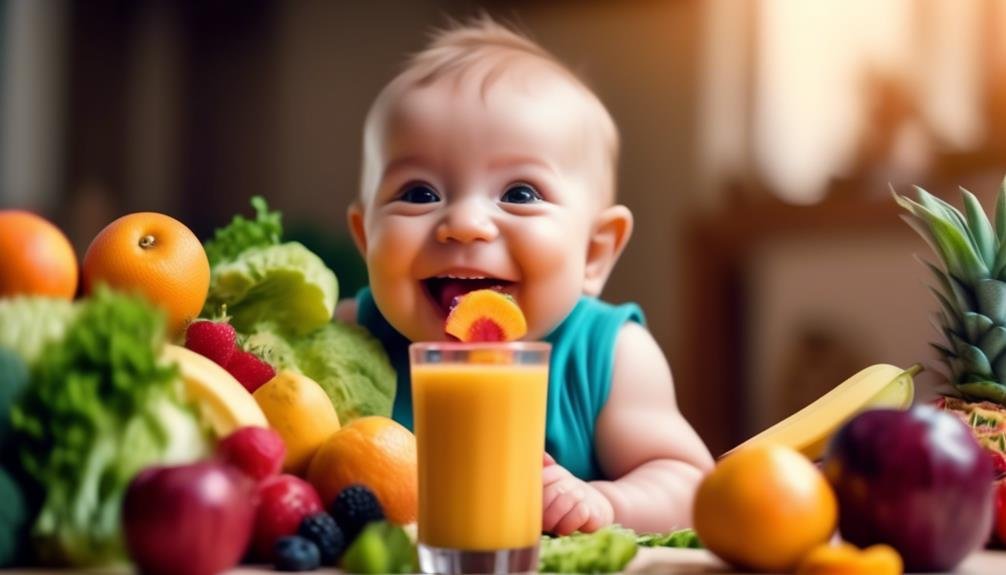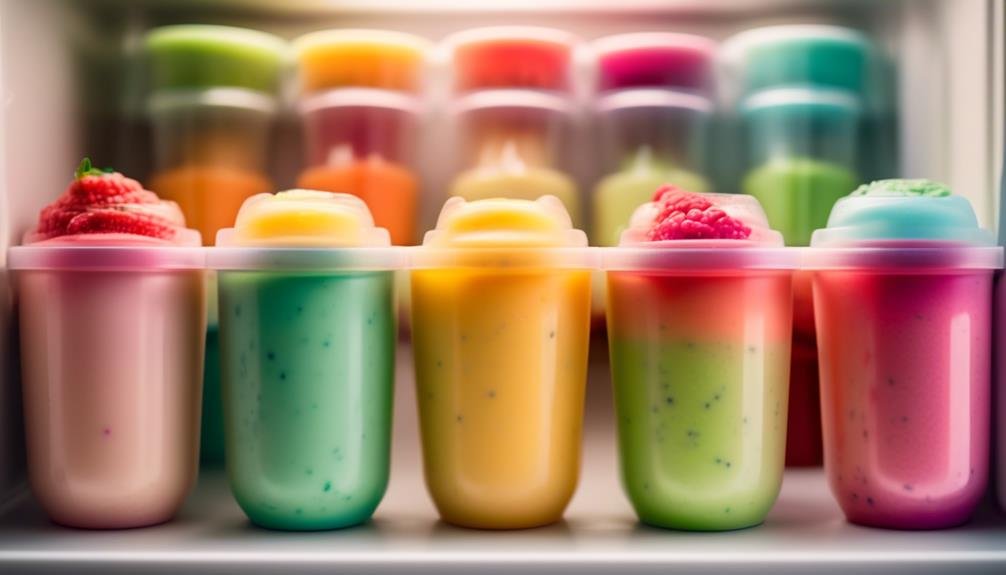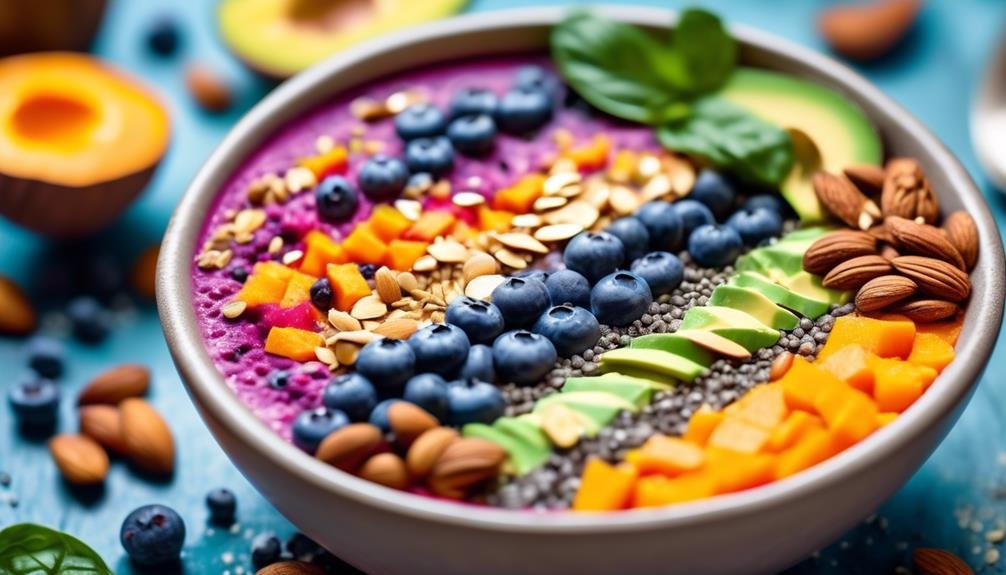"Cherishing Little Steps - A Haven for Baby and Family Journeys"
Baby's First Smoothies
They say, 'You are what you eat.' And as a parent, you want to give your baby the best start in life. That's where baby's first smoothies come in.
These nutritious blends not only introduce your little one to new flavors and textures, but they also provide essential vitamins and minerals for healthy growth and development.
But how do you know which ingredients are best for your baby? When should you start introducing smoothies? And how do you ensure their safety?
In this discussion, we will explore these questions and more, guiding you through the exciting journey of embracing baby's first smoothies.
Get ready to nourish your little one in a whole new way!
Key Takeaways
- Baby smoothies are a simple and nutritious way to introduce fruits and vegetables to babies.
- Homemade smoothies offer control over ingredients and can help with picky eaters.
- Smoothies have a smooth texture that aids in consumption and digestion, and they promote overall health and natural flavors.
- Baby smoothies provide a variety of nutrients including essential vitamins, minerals, and antioxidants, and help expand the baby's palate and encourage them to embrace new flavors.
Why Choose Smoothies for Babies

Why choose smoothies for your baby? They're a simple, nutritious way to introduce a variety of fruits and vegetables into their diet. Homemade smoothies offer numerous benefits, especially for picky eaters. By blending fruits and vegetables together, you can create a flavorful drink that's packed with essential nutrients. The smooth texture of the drink makes it easier for babies to consume and digest, while still providing them with the necessary vitamins and minerals they need for healthy growth and development.
One of the main advantages of homemade smoothies is that you have full control over the ingredients. You can choose organic fruits and vegetables, ensuring that your baby is getting the best quality produce without any added sugars or preservatives. This not only promotes their overall health but also helps to develop their taste buds for natural flavors.
Introducing smoothies to picky eaters can be a game-changer. Even if your baby refuses to eat certain fruits or vegetables in their solid form, blending them into a smoothie can make them more appealing. You can gradually increase the ratio of fruits and vegetables to help them get used to the taste and texture. It's a sneaky way to sneak in those essential nutrients without any fuss.
Nutritional Benefits of Baby Smoothies
When it comes to the nutritional benefits of baby smoothies, you'll be delighted to discover the abundant vitamins, minerals, and antioxidants that these homemade blends provide. Introducing solids to your little one's diet can be an exciting milestone, and homemade baby food, such as smoothies, can offer a range of nutrients that promote healthy growth and development.
One of the key advantages of baby smoothies is that they can be packed with essential vitamins. Fruits and vegetables, which are commonly used in these blends, are rich in vitamins such as vitamin C, vitamin A, and folate. These vitamins play a crucial role in supporting your baby's immune system, vision, and overall health.
Baby smoothies are also a great source of minerals. Ingredients like spinach, kale, and bananas are excellent sources of minerals like iron, calcium, and potassium. These minerals are important for bone development, muscle function, and maintaining a healthy blood supply.
Furthermore, baby smoothies are loaded with antioxidants. Antioxidants help protect your baby's cells from damage by neutralizing harmful free radicals. Berries, such as blueberries and strawberries, are particularly high in antioxidants and can be included in your baby's smoothie for an added health boost.
When to Introduce Smoothies to Your Baby

To ensure your baby receives the maximum nutritional benefits from smoothies, it's important to introduce them at the appropriate stage of their development. Introducing solids is a crucial milestone in your baby's journey towards a well-rounded diet. Here are some key points to consider when deciding when to introduce smoothies to your little one:
- Consult with your pediatrician: Before introducing any new foods, it's always best to consult with your pediatrician. They can provide guidance based on your baby's individual needs and development.
- Start with single-ingredient purees: When your baby is around 6 months old and has successfully started eating solids, you can begin introducing single-ingredient purees such as mashed fruits or vegetables.
- Gradually introduce smoothies: Once your baby has adapted to single-ingredient purees, you can start adding small amounts of breast milk, formula, or yogurt to create a smoother consistency.
- Monitor for allergies: As with any new food, it's important to monitor your baby for any signs of allergies or discomfort. Start with small amounts and gradually increase the portion size.
- Smoothie alternatives: If your baby isn't ready for smoothies, you can still provide them with the nutritional benefits by offering mashed fruits or vegetables in a more traditional form.
Selecting the Best Ingredients for Baby Smoothies
Now that you know when to introduce smoothies to your baby, let's explore the best ingredients to include in their nutritious blends. Making homemade baby smoothies can be a great way to introduce your little one to new flavors and textures while ensuring they get the essential nutrients they need. Here are some key ingredients to consider for your baby smoothie recipes:
| Fruits | Vegetables |
|---|---|
| Bananas | Avocado |
| Blueberries | Spinach |
| Mango | Carrots |
When selecting fruits for your baby's smoothies, opt for ripe and soft varieties that are easy to blend and digest. Bananas are a popular choice as they provide natural sweetness and a creamy texture. Blueberries are rich in antioxidants and can add a vibrant color to your baby's smoothie. Mangoes are packed with vitamins and minerals, and their sweet taste is usually well-received by babies.
Incorporating vegetables into your baby's smoothies is a fantastic way to introduce them to a variety of flavors and boost their nutrient intake. Avocado adds a creamy texture and healthy fats, while spinach provides iron and calcium. Carrots are a great source of vitamin A and can add a subtle sweetness to the smoothie.
How to Prepare and Store Baby Smoothies

To prepare and store baby smoothies, follow these simple steps to ensure your little one receives the freshest and most nutritious blends.
- Choose organic fruits and vegetables: Opt for fresh, organic produce to minimize exposure to harmful pesticides and chemicals. This will provide your baby with cleaner and healthier ingredients for their smoothies.
- Wash and peel the ingredients: Thoroughly wash all fruits and vegetables before peeling them. This removes any dirt or bacteria that may be present on the skin, ensuring a safe and clean smoothie for your baby.
- Steam or cook certain ingredients: Some fruits and vegetables, like apples or carrots, may need to be steamed or cooked before blending. This softens them and makes them easier for your baby to digest.
- Blend until smooth: Use a high-quality blender to puree the ingredients into a smooth and creamy consistency. This ensures that your baby can easily consume and enjoy their smoothie without any chunky or lumpy textures.
- Store in small portions: Divide the smoothie into small airtight containers or ice cube trays. This allows you to defrost and serve just the right amount for your baby, reducing waste and ensuring freshness.
Recommended Smoothie Recipes for Babies
When it comes to introducing your baby to the world of smoothies, there are plenty of delicious and nutrient-packed recipes to explore. Smoothies can be a great way to introduce new flavors and textures to your little one, and they're also a convenient option for busy parents.
When preparing smoothies for your baby, it's important to consider their nutritional needs and any dietary restrictions they may have.
For babies who are following the baby-led weaning approach, you can start by introducing simple fruit and vegetable smoothies. Try blending together ripe bananas with a handful of spinach or kale for a nutrient-rich and easy-to-digest smoothie. Another option is to combine avocado, mango, and a splash of coconut milk for a creamy and tropical treat.
As your baby gets older and more comfortable with solids, you can start experimenting with different ingredients. You can try adding Greek yogurt for added protein and calcium, or nut butters for healthy fats. Be sure to introduce new ingredients one at a time to monitor your baby's reaction and to identify any potential allergies.
Remember to always consult with your pediatrician before introducing new foods to your baby, especially if they've any known allergies or digestive issues.
With these nutrient-packed smoothie recipes, you can introduce solids to your baby in a fun and delicious way, while ensuring they're getting the necessary nutrients for healthy growth and development.
Adding Superfoods to Boost Baby's Nutrition

Boost your baby's nutrition by incorporating superfoods into their smoothies. Superfoods are packed with nutrients that can help support your baby's growth and development. Here are some superfood choices to consider when introducing new flavors to your little one's smoothies:
- Avocado: Rich in healthy fats, avocados provide essential nutrients like vitamin E and folate, which are important for brain development.
- Spinach: This leafy green is high in iron and vitamin K, both of which are crucial for healthy blood and bone development.
- Chia seeds: These tiny seeds are a great source of omega-3 fatty acids, fiber, and protein. They can help support brain and eye development.
- Blueberries: Bursting with antioxidants, blueberries provide a wide range of vitamins and minerals. They can help boost your baby's immune system.
- Greek yogurt: Full of protein and calcium, Greek yogurt is a great addition to your baby's smoothies. It can support bone and muscle development.
Tips for Introducing New Flavors and Textures
As you continue to enhance your baby's nutrition with superfoods in their smoothies, it's important to know some tips for introducing new flavors and textures. Introducing variety into your baby's diet is crucial for their overall development and palate expansion. By doing so, you can help them become adventurous eaters as they grow.
One way to introduce new flavors is by gradually adding small amounts of different fruits or vegetables to their smoothies. Start with mild flavors like banana or avocado, then slowly incorporate more vibrant options like berries or spinach. This gradual approach allows your baby to adapt to new tastes without overwhelming their senses.
In addition to introducing new flavors, it's also essential to consider the textures of the ingredients. Babies are naturally curious, and sensory exploration plays a vital role in their development. You can experiment with different textures by blending fruits and vegetables to create a smooth puree or leaving some small chunks for them to explore. This way, they can experience different sensations as they enjoy their smoothies.
Smoothie Safety Tips for Babies

To ensure the safety of your baby while enjoying smoothies, it's important to follow some key tips. Smoothies can be a nutritious and delicious way to introduce different textures and flavors to your little one. Here are some smoothie safety guidelines to keep in mind:
- Choose the right ingredients: Opt for fresh fruits and vegetables that are ripe and free from any bruises or mold. Avoid using any ingredients that your baby may be allergic to.
- Wash thoroughly: Make sure to wash all fruits and vegetables before adding them to the blender. This will help remove any dirt or bacteria that may be present.
- Cut into small pieces: Cut fruits and vegetables into small, bite-sized pieces to prevent choking hazards.
- Monitor consistency: Start with a thinner consistency and gradually increase thickness as your baby gets used to it. This will help them adjust to different textures.
- Serve immediately: Smoothies should be served fresh and consumed immediately to ensure optimal safety and freshness.
Frequently Asked Questions About Baby Smoothies
If you still have questions about safely incorporating smoothies into your baby's diet, we've got answers. Here are some frequently asked questions about baby smoothies:
- Can I make my own baby smoothie recipes?
Absolutely! Making your own baby smoothie recipes allows you to control the ingredients and ensure your baby gets the nutrients they need. Start with simple combinations like banana and avocado or pear and spinach. Gradually introduce new flavors and textures as your baby grows.
- What're some common mistakes with baby smoothies?
One common mistake is adding too much sugar or sweeteners. It's best to let the natural sweetness of fruits be the main source of sweetness. Another mistake is using inappropriate ingredients, such as honey or cow's milk, before your baby is ready. Finally, make sure to blend the smoothie well to avoid any choking hazards.
Remember to always consult with your pediatrician before introducing new foods to your baby's diet. They can provide personalized recommendations based on your baby's specific needs.
Conclusion: Embracing Baby's First Smoothies

Embrace the goodness of baby's first smoothies as you nourish your little one with essential nutrients for healthy growth and development. Introducing your baby to smoothies is an exciting milestone that opens up a world of flavors and encourages the development of healthy habits.
Here are a few reasons why embracing baby's first smoothies is a great choice for you and your little one:
- Variety of nutrients: Smoothies allow you to blend a variety of fruits, vegetables, and other nutritious ingredients into a delicious drink. This ensures that your baby receives a wide range of essential vitamins, minerals, and antioxidants.
- Texture exploration: Smoothies provide an opportunity for your baby to explore different textures. You can gradually introduce new ingredients, allowing your little one to adapt to various consistencies and develop their chewing skills.
- Flavor experimentation: By incorporating different fruits and vegetables, you can expose your baby to a myriad of flavors. This helps expand their palate and encourages them to embrace new tastes from an early age.
- Hydration: Smoothies can be a refreshing way to keep your baby hydrated, especially during hot weather or when they're reluctant to drink plain water.
- Building healthy habits: Introducing smoothies early on can establish a foundation for healthy eating habits. By offering nutrient-dense options, you're instilling the importance of nourishing foods in your baby's routine.
Embrace the journey of introducing baby's first smoothies, and watch your little one thrive as they explore new flavors and develop healthy habits.
Frequently Asked Questions
Can I Use Frozen Fruits in Baby Smoothies?
Yes, you can use frozen fruits in baby smoothies. However, using fresh fruits has more benefits. They contain more nutrients and are easier for your baby to digest. Start by introducing small amounts and gradually increase.
Are There Any Fruits That Are Not Suitable for Baby Smoothies?
Some fruits may not be suitable for baby smoothies. It's important to avoid fruits like citrus, strawberries, and pineapple as they can be harsh on their delicate tummies. Stick to nutrient-rich options like bananas and avocados for optimal health benefits.
Can I Add Yogurt or Milk to Baby Smoothies?
You can definitely add yogurt or milk to your baby's smoothies. Yogurt provides calcium and probiotics, while alternative milk options like almond milk or coconut milk can be used for a dairy-free alternative.
How Often Should I Give My Baby a Smoothie?
You should introduce smoothies to your baby gradually and start with small amounts. Incorporating smoothies in your baby's diet can provide various benefits, but it's important to consult with your pediatrician and follow their recommendations for frequency.
Can I Use a Blender or Should I Use a Baby Food Maker to Prepare Baby Smoothies?
You can use either a blender or a baby food maker to prepare baby smoothies. Both options work well, but if you want a smoother texture, a baby food maker might be a better choice.
Conclusion
In conclusion, introducing smoothies to your baby can be a nutritious and exciting way to expand their palate.
While some may worry about the sugar content in smoothies, it's important to choose ingredients wisely and limit added sugars.
By using natural sweeteners like ripe fruits and vegetables, you can provide your baby with a nutrient-rich beverage that supports their growth and development.
So don't hesitate to embrace baby's first smoothies and enjoy this delicious and healthy journey together!


